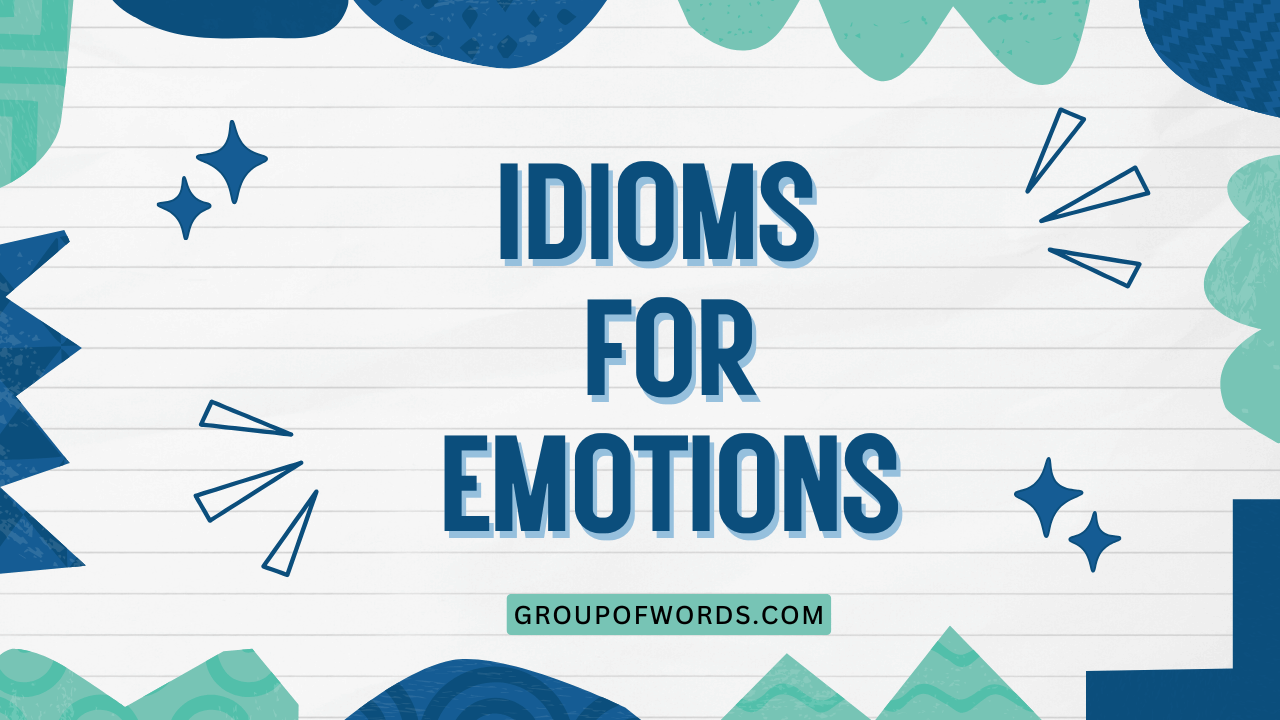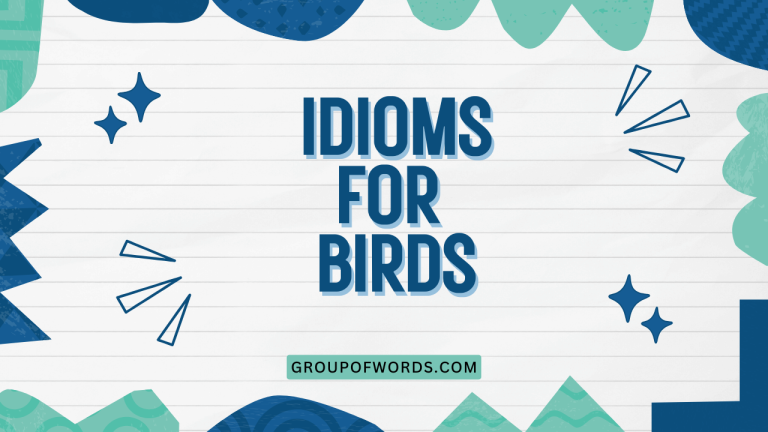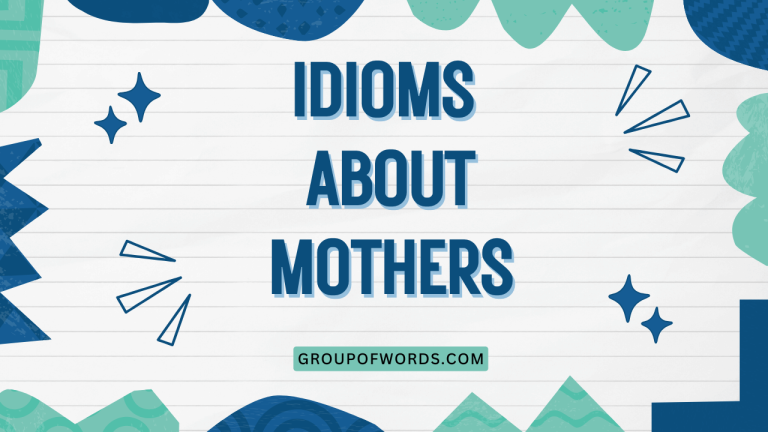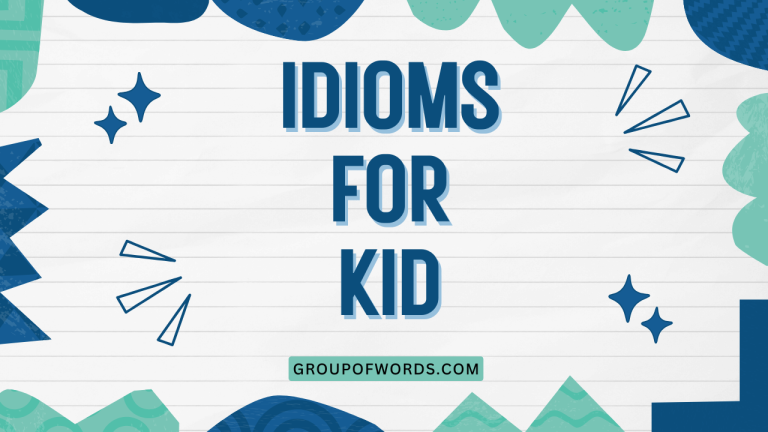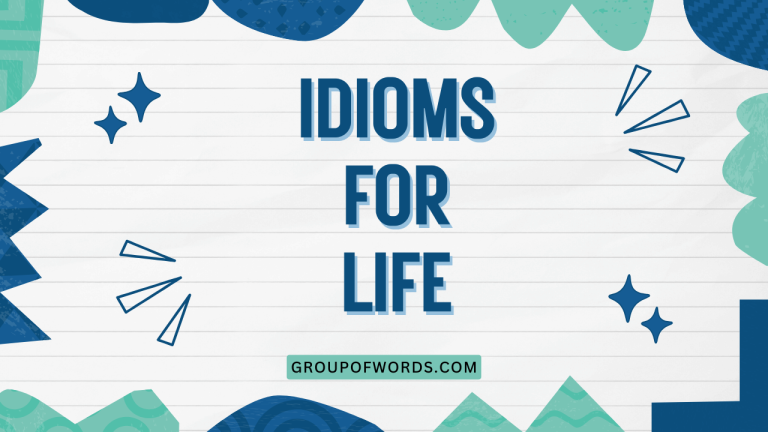Express Yourself: Mastering Idioms for Emotions
Understanding idioms is crucial for mastering English, as they add color and depth to everyday conversations and writing. Idioms related to emotions are particularly important because they allow us to express feelings in nuanced and vivid ways.
This article will provide a comprehensive guide to idioms for emotions, covering their definitions, structures, usage rules, and common mistakes. Whether you’re an ESL student, a native speaker looking to enrich your vocabulary, or simply someone interested in the intricacies of the English language, this guide will help you effectively express your emotions using idioms.
By learning these idioms, you’ll not only improve your comprehension of spoken and written English but also gain the ability to articulate your feelings with greater precision and flair. From joy and excitement to sadness and anger, this article will equip you with the tools to navigate the emotional landscape of the English language with confidence.
Table of Contents
- Introduction
- Definition of Idioms for Emotions
- Structural Breakdown
- Types and Categories of Idioms for Emotions
- Examples of Idioms for Emotions
- Usage Rules for Idioms
- Common Mistakes with Idioms
- Practice Exercises
- Advanced Topics
- Frequently Asked Questions
- Conclusion
Definition of Idioms for Emotions
An idiom is a phrase or expression whose meaning cannot be understood from the literal meanings of its individual words. Instead, idioms have a figurative meaning that is culturally specific.
Idioms for emotions are a subset of idioms that specifically describe feelings, moods, or emotional states. These idioms often use vivid imagery or metaphors to convey complex emotions in a concise and memorable way.
Understanding idioms related to emotions is crucial for interpreting and expressing feelings accurately in English. These idioms allow speakers to communicate emotional nuances that might be difficult to convey through literal language alone.
For example, saying someone is “over the moon” expresses a level of happiness that goes beyond simply saying they are “happy.” Idioms add color and depth to emotional expression, making communication more engaging and relatable.
These idioms can be classified based on the emotion they represent, such as happiness, sadness, anger, fear, surprise, and love. They function as adjectives, adverbs, verbs, or even nouns within a sentence, depending on the specific idiom.
The context in which an idiom is used is vital for understanding its intended meaning. For example, “to have a chip on your shoulder” implies resentment or bitterness, while “to wear your heart on your sleeve” suggests openness and vulnerability.
Structural Breakdown
The structure of idioms varies widely. Some idioms are short phrases, while others are complete sentences.
They often involve metaphors, similes, or other figures of speech. Understanding the grammatical structure of an idiom can help in recognizing and using it correctly, even if the literal meaning doesn’t make sense.
Many idioms follow common grammatical patterns, such as verb + preposition combinations (e.g., “to fly off the handle”), noun phrases (e.g., “a broken heart”), or adjective phrases (e.g., “on cloud nine”). The key is to recognize that the entire phrase functions as a single unit of meaning, regardless of its individual components.
For example, in the idiom “to feel blue,” “blue” doesn’t literally refer to the color; instead, the entire phrase signifies sadness.
Furthermore, some idioms can be modified slightly to fit different grammatical contexts. For instance, “to be on cloud nine” can be used as “She was on cloud nine after receiving the promotion.” However, it’s essential to be cautious when modifying idioms, as altering them too much can diminish their impact or make them incomprehensible.
The flexibility of an idiom depends on its specific structure and the context in which it’s used. Understanding these subtle nuances is key to mastering idiomatic expressions in English.
Types and Categories of Idioms for Emotions
Idioms for emotions can be categorized based on the specific emotion they describe. Here’s a breakdown of common categories:
Idioms for Happiness and Joy
These idioms express feelings of joy, contentment, and excitement. They often involve metaphors related to light, height, or positive experiences.
Examples include “on cloud nine,” “over the moon,” and “in seventh heaven.”
Idioms for Sadness and Disappointment
These idioms describe feelings of sorrow, disappointment, and grief. They often use metaphors related to darkness, weight, or negative experiences.
Examples include “feeling blue,” “down in the dumps,” and “a broken heart.”
Idioms for Anger and Frustration
These idioms express feelings of anger, irritation, and resentment. They often involve metaphors related to heat, explosion, or aggression.
Examples include “to fly off the handle,” “to see red,” and “to have a chip on your shoulder.”
Idioms for Fear and Anxiety
These idioms describe feelings of fear, worry, and nervousness. They often use metaphors related to cold, trembling, or impending danger.
Examples include “to have butterflies in your stomach,” “to be scared stiff,” and “to be on pins and needles.”
Idioms for Surprise and Shock
These idioms express feelings of astonishment, disbelief, and shock. They often involve metaphors related to sudden impact, speechlessness, or disorientation.
Examples include “to be taken aback,” “to be floored,” and “to knock someone’s socks off.”
Idioms for Love and Affection
These idioms describe feelings of love, affection, and admiration. They often involve metaphors related to warmth, connection, or devotion.
Examples include “to be head over heels in love,” “to wear your heart on your sleeve,” and “to have a soft spot for someone.”
Examples of Idioms for Emotions
Here are several examples of idioms for emotions, organized by category. Each table will provide a list of idioms, their meanings, and example sentences to illustrate their usage.
Happiness and Joy
The following table provides a comprehensive list of idioms used to express happiness and joy.
| Idiom | Meaning | Example Sentence |
|---|---|---|
| On cloud nine | Extremely happy | She was on cloud nine after getting engaged. |
| Over the moon | Extremely pleased | They were over the moon when their team won the championship. |
| In seventh heaven | Completely happy | He’s been in seventh heaven since his daughter was born. |
| Happy as a clam | Very happy and content | He’s as happy as a clam now that he’s retired. |
| Walking on air | Feeling elated | She was walking on air after the successful presentation. |
| Grinning from ear to ear | Smiling widely | He was grinning from ear to ear when he opened his birthday presents. |
| Full of the joys of spring | Happy and energetic | The children were full of the joys of spring on their school trip. |
| Tickled pink | Very pleased or amused | She was tickled pink to receive flowers on her anniversary. |
| Jump for joy | Express great happiness | They jumped for joy when they heard the good news. |
| Have a whale of a time | Enjoy oneself greatly | We had a whale of a time at the beach yesterday. |
| Be on top of the world | Feeling extremely happy and successful | After acing his exams, he felt on top of the world. |
| Paint the town red | Go out and celebrate exuberantly | They decided to paint the town red after the victory. |
| Have a blast | Enjoy oneself immensely | We had a blast at the concert last night. |
| Be in good spirits | Feeling cheerful and positive | She was in good spirits despite the challenges she faced. |
| Lighten up | Become more cheerful and less serious | Why don’t you lighten up a bit and enjoy the party? |
| Beam with joy | Radiate happiness | She beamed with joy as she accepted the award. |
| A ray of sunshine | A person who brings happiness to others | Her cheerful personality makes her a ray of sunshine in the office. |
| Be as pleased as Punch | Extremely pleased and satisfied | He was as pleased as Punch with his new car. |
| Laugh your head off | Laugh uncontrollably | We laughed our heads off at the comedian’s jokes. |
| Be on a high | Feeling elated and excited | She was on a high after winning the competition. |
| Sing someone’s praises | Speak very highly of someone | The manager was singing her praises for her excellent work. |
| Get a kick out of something | Find something very enjoyable or amusing | He gets a kick out of watching comedy movies. |
| Be in high spirits | Feeling cheerful and lively | The team was in high spirits before the game. |
Sadness and Disappointment
The following table illustrates idioms used to express sadness and disappointment.
| Idiom | Meaning | Example Sentence |
|---|---|---|
| Feeling blue | Feeling sad or depressed | She’s been feeling blue since her vacation ended. |
| Down in the dumps | Feeling unhappy and discouraged | He’s been down in the dumps since he lost his job. |
| A broken heart | Feeling grief after a relationship ends | She had a broken heart after her boyfriend broke up with her. |
| Have a long face | Looking sad or disappointed | He had a long face after failing the exam. |
| Tears welling up | Starting to cry | Tears were welling up in her eyes as she watched the movie. |
| Cry your eyes out | Cry intensely for a long time | She cried her eyes out after the tragic news. |
| A lump in your throat | Feeling emotional and close to tears | He had a lump in his throat as he said goodbye. |
| Down in the mouth | Looking sad or depressed | He’s been down in the mouth ever since he got the bad news. |
| Heavy-hearted | Feeling sad or sorrowful | She felt heavy-hearted after the funeral. |
| Sing the blues | Express sadness or complain | He’s been singing the blues about his financial problems. |
| At the end of your rope | Feeling like you can’t cope anymore | She was at the end of her rope after dealing with the constant stress. |
| A cloud hanging over someone | A feeling of sadness or worry | There’s been a cloud hanging over him since his accident. |
| Inconsolable | Unable to be comforted | She was inconsolable after losing her pet. |
| Hit rock bottom | Reach the lowest point in a situation | He hit rock bottom when he lost his home. |
| Take a beating | Experience significant hardship or loss | The company took a beating during the economic downturn. |
| Wallowing in sorrow | Indulging in sadness | She spent weeks wallowing in sorrow after the breakup. |
| A shadow of your former self | Looking weak or diminished | He was a shadow of his former self after the illness. |
| Be crestfallen | Disappointed and dejected | He was crestfallen when he didn’t get the job. |
| Mourning period | A time of grieving | The company observed a mourning period after the CEO’s death. |
| Have a sinking feeling | Feeling that something bad is about to happen | I had a sinking feeling when the doctor called. |
| Disappointment written all over your face | Showing clear signs of disappointment | Disappointment was written all over her face when she saw her grade. |
| Sour grapes | Pretending to dislike something because you can’t have it | He said he didn’t want the promotion anyway, but it was just sour grapes. |
| Have a pity party | Engage in self-pity | Stop having a pity party and focus on finding a solution. |
Anger and Frustration
This table lists idioms used to express anger and frustration, providing their meanings and example sentences.
| Idiom | Meaning | Example Sentence |
|---|---|---|
| To fly off the handle | To suddenly become very angry | He flew off the handle when he saw the damage to his car. |
| To see red | To become extremely angry | She saw red when she found out he had lied to her. |
| To have a chip on your shoulder | To be resentful or bitter about something | He’s had a chip on his shoulder ever since he was passed over for promotion. |
| To be hopping mad | To be extremely angry | She was hopping mad when she found out her flight was cancelled. |
| To blow a fuse | To lose your temper | He blew a fuse when the printer stopped working again. |
| To bite someone’s head off | To respond angrily to someone | She bit his head off when he asked a simple question. |
| To be fed up | To be annoyed or bored with something | I’m fed up with his constant complaining. |
| To be at the end of your tether | To have no patience or energy left | After dealing with difficult customers all day, she was at the end of her tether. |
| To get your back up | To become angry or defensive | He got his back up when I questioned his decision. |
| To be riled up | To be agitated or angered | The crowd was riled up by the speaker’s controversial remarks. |
| To be like a bear with a sore head | To be in a bad mood and easily irritated | He’s been like a bear with a sore head since he failed his driving test. |
| To be in a foul mood | To be in a bad temper | She’s been in a foul mood all morning. |
| To have had it up to here | To be completely fed up with something | I’ve had it up to here with his excuses. |
| To make someone’s blood boil | To make someone extremely angry | His arrogance makes my blood boil. |
| To rub someone the wrong way | To annoy someone | He always rubs me the wrong way with his sarcastic comments. |
| To get under someone’s skin | To irritate or annoy someone | His constant humming gets under my skin. |
| To lose your cool | To become angry and lose control | He lost his cool when he heard the news. |
| To hit the roof | To become very angry | My dad will hit the roof when he finds out about this. |
| To drive someone up the wall | To irritate or annoy someone intensely | His constant questions are driving me up the wall. |
| To foam at the mouth | To be extremely angry | He was foaming at the mouth when he found out his car had been vandalized. |
| To have a short fuse | To get angry easily | He has a short fuse, so be careful what you say to him. |
| To bristle at something | To react defensively or angrily | She bristled at the suggestion that she was incompetent. |
| To be livid | To be extremely angry | She was livid when she discovered the mistake. |
Fear and Anxiety
The subsequent table provides idioms used to express fear and anxiety, along with their meanings and example sentences.
| Idiom | Meaning | Example Sentence |
|---|---|---|
| To have butterflies in your stomach | To feel nervous or anxious | I have butterflies in my stomach before giving presentations. |
| To be scared stiff | To be very frightened | She was scared stiff when she heard the strange noise. |
| To be on pins and needles | To be anxious and nervous | We were on pins and needles waiting for the test results. |
| To be a nervous wreck | To be extremely anxious and stressed | She was a nervous wreck before her wedding. |
| To have cold feet | To be nervous about doing something | He got cold feet and decided not to go skydiving. |
| To be shaking in your boots | To be very scared | The thought of public speaking had him shaking in his boots. |
| To be petrified | To be extremely frightened | She’s petrified of spiders. |
| To be in a cold sweat | To be very nervous and sweating | He woke up in a cold sweat after having a nightmare. |
| To be frightened out of your wits | To be extremely scared | The sudden bang frightened her out of her wits. |
| To jump out of your skin | To be startled or frightened | I jumped out of my skin when the door slammed shut. |
| To be a bundle of nerves | To be very nervous and anxious | She was a bundle of nerves before the job interview. |
| To be on edge | To be nervous and irritable | He’s been on edge since the accident. |
| To have the jitters | To feel nervous and restless | I always get the jitters before a big game. |
| To be worried sick | To be extremely worried | She was worried sick when her son didn’t come home. |
| To be at your wits’ end | To be so worried that you don’t know what to do | They were at their wits’ end trying to find their lost dog. |
| To have a sinking heart | To feel a sense of dread | I had a sinking heart when I saw the email from my boss. |
| To be on tenterhooks | To be in a state of suspense or anxiety | We were on tenterhooks waiting for the election results. |
| To be frozen with fear | To be so scared that you can’t move | She was frozen with fear when she saw the bear. |
| To be like a deer caught in headlights | To be startled and unable to react | He was like a deer caught in headlights when they asked him the question. |
| To hang by a thread | To be in a precarious or dangerous situation | His career was hanging by a thread after the scandal. |
| To have a close call | To narrowly avoid danger | He had a close call when the car swerved in front of him. |
| To sweat bullets | To be very nervous and anxious | He was sweating bullets during the presentation. |
| To look like you’ve seen a ghost | To look extremely frightened or shocked | You look like you’ve seen a ghost! What happened? |
Surprise and Shock
The subsequent table provides idioms used to express surprise and shock, along with their meanings and example sentences.
| Idiom | Meaning | Example Sentence |
|---|---|---|
| To be taken aback | To be surprised and slightly shocked | I was taken aback by her sudden announcement. |
| To be floored | To be greatly surprised or overwhelmed | I was floored when I heard I had won the lottery. |
| To knock someone’s socks off | To greatly impress or surprise someone | The performance knocked my socks off. |
| To be speechless | Unable to speak because of surprise or shock | I was speechless when I saw the surprise party. |
| To be thunderstruck | To be extremely surprised or shocked | He was thunderstruck when he heard the news. |
| To be gobsmacked | To be utterly astonished or surprised | I was gobsmacked when I saw how much weight he’d lost. |
| To be in disbelief | Unable to believe something | She was in disbelief when she heard the news of his death. |
| To be aghast | To be filled with horror or shock | We were aghast at the level of destruction. |
| To catch someone off guard | To surprise someone unexpectedly | The question caught me off guard. |
| To come as a bolt from the blue | To be a complete and unexpected surprise | The announcement came as a bolt from the blue. |
| To do a double take | To look again in surprise | I did a double take when I saw her walking down the street. |
| To have your jaw drop | To be very surprised or shocked | My jaw dropped when I saw the price tag. |
| To not believe your eyes | To be so surprised that you can’t believe what you’re seeing | I couldn’t believe my eyes when I saw him there. |
| To make your hair stand on end | To be very frightening or shocking | The story made my hair stand on end. |
| To be flabbergasted | To be greatly surprised or astonished | I was flabbergasted by his generosity. |
| To be dumbfounded | To be so surprised that you can’t speak | I was dumbfounded by the news. |
| To be bowled over | To be overwhelmed with surprise or admiration | I was bowled over by her talent. |
| To be knocked for six | To be shocked or upset | He was knocked for six when he lost his job. |
| To give someone the shock of their life | To greatly surprise or frighten someone | The sudden noise gave me the shock of my life. |
| To leave someone reeling | To leave someone feeling shocked and disoriented | The news left her reeling. |
| To be staggered | To be deeply shocked or astonished | I was staggered by the amount of money he had. |
| To have the rug pulled out from under you | To have something unexpected happen that ruins your plans | He felt like the rug had been pulled out from under him when he lost the deal. |
Love and Affection
The following table provides idioms used to express love and affection, along with their meanings and example sentences.
| Idiom | Meaning | Example Sentence |
|---|---|---|
| To be head over heels in love | To be completely in love | They are head over heels in love with each other. |
| To wear your heart on your sleeve | To openly show your emotions | She wears her heart on her sleeve, so everyone knows how she feels. |
| To have a soft spot for someone | To feel affection for someone | He has a soft spot for his younger sister. |
| To be lovey-dovey | To be affectionate in a way that is excessive or annoying to others | They were being very lovey-dovey on their anniversary. |
| To be smitten with someone | To be suddenly and strongly attracted to someone | He’s smitten with the new girl in class. |
| To be the apple of someone’s eye | To be someone’s favorite person | His granddaughter is the apple of his eye. |
| To be a match made in heaven | To be a perfect couple | They are a match made in heaven. |
| To have eyes only for someone | To be attracted to only one person | He has eyes only for her. |
| To be sweet on someone | To be in love with someone | He’s been sweet on her for years. |
| To be an item | To be in a romantic relationship | They’ve been an item since they met at college. |
| To get hitched | To get married | They decided to get hitched last summer. |
| To tie the knot | To get married | They are planning to tie the knot next year. |
| To pop the question | To propose marriage | He’s planning to pop the question on their anniversary. |
| To be each other’s better half | To be a perfect partner for someone | They are each other’s better half. |
| To be two peas in a pod | To be very similar and close | They are two peas in a pod. |
| To be inseparable | To be unable to be parted or separated | They are inseparable since they met. |
| To have a crush on someone | To have a brief but intense infatuation with someone | She has a crush on the new teacher. |
| To fall for someone | To start to love someone | He fell for her the moment he saw her. |
| To carry a torch for someone | To continue to be in love with someone even after a relationship has ended | He still carries a torch for his ex-girlfriend. |
| To spark a flame | To start a romantic relationship | They sparked a flame during their vacation. |
| To hit it off | To get along well with someone immediately | They hit it off at the party. |
| To be kindred spirits | To be people who share similar interests and feelings | They are kindred spirits and understand each other perfectly. |
Usage Rules for Idioms
Using idioms correctly requires attention to context, grammar, and cultural understanding. Here are some general rules:
- Context is Key: Always consider the situation in which you’re using an idiom. Idioms are often informal and may not be appropriate in formal settings.
- Grammatical Form: Pay attention to the grammatical structure of the idiom. Some idioms are fixed phrases and cannot be altered, while others allow for some flexibility.
- Cultural Sensitivity: Be aware that idioms are culturally specific. An idiom that is common in one culture may be unfamiliar or even offensive in another.
- Avoid Overuse: Using too many idioms can make your language sound unnatural or forced. Use them sparingly and only when they enhance your message.
- Understand the Meaning: Make sure you fully understand the meaning of an idiom before using it. Using an idiom incorrectly can lead to confusion or miscommunication.
For example, it’s generally acceptable to say, “She was on cloud nine,” but altering it to “She was on a cloud nine” would be incorrect because the idiom is a fixed phrase. Similarly, using the idiom “to fly off the handle” in a job interview to describe your reaction to a problem would be inappropriate due to its informal and potentially aggressive connotation.
Common Mistakes with Idioms
One of the most common mistakes is misinterpreting the meaning of an idiom. This can lead to using the idiom in the wrong context or conveying an unintended message.
Another frequent error is altering the structure of an idiom, which can make it incomprehensible.
Here are some examples of common mistakes and their corrections:
| Incorrect | Correct | Explanation | |
|---|---|---|---|
| “He felt blue skies after the breakup.” | “He felt blue after the breakup.” | “Blue skies” doesn’t convey sadness; “feeling blue” does. | |
| “She jumped for happy when she got the job.” | “She jumped for joy when she got the job.” | The correct idiom is “jump for joy,” not “jump for happy.” | |
| “He was in the seventh heaven of happiness.” | “He was in seventh heaven.” | The phrase “of happiness” is redundant and unnecessary. | |
| “She said that she have butterflies in her stomach | “She said that she has butterflies in her stomach.” | “She said that she had butterflies in her stomach.” | The tense should be consistent with the context of the sentence. |
To avoid these mistakes, it’s essential to study idioms in context and practice using them in your own writing and speaking. Pay attention to how native speakers use idioms and ask for clarification if you’re unsure of their meaning or usage.
Practice Exercises
Test your understanding of idioms for emotions with the following exercises:
Exercise 1: Matching
Match the idiom with its correct meaning.
- Feeling blue
- To fly off the handle
- To have butterflies in your stomach
- To be over the moon
- To be scared stiff
- To be extremely frightened
- To suddenly become very angry
- To be extremely pleased
- To feel nervous or anxious
- To feel sad or depressed
Answers:
1: e, 2: b, 3: d, 4: c, 5: a
Exercise 2: Fill in the Blanks
Complete the following sentences with the correct idiom.
- She was __________ when she found out she had won the scholarship. (on cloud nine / feeling blue)
- He __________ when he saw the scratch on his new car. (flew off the handle / had a soft spot)
- I __________ before my job interview. (had butterflies in my stomach / hit the roof)
- They are __________ with each other. (head over heels in love / down in the dumps)
- She was __________ after watching the horror movie. (scared stiff / over the moon)
Answers:
1: on cloud nine, 2: flew off the handle, 3: had butterflies in my stomach, 4: head over heels in love, 5: scared stiff
Exercise 3: Correct the Mistake
Identify and correct the mistake in each sentence.
- He felt blue skies after the breakup.
- She jumped for happy when she got the job.
- He was in the seventh heaven of happiness.
Answers:
1: He felt blue after the breakup., 2: She jumped for joy when she got the job., 3: He was in seventh heaven.
Advanced Topics
For those looking to deepen their understanding of idioms for emotions, here are some advanced topics to explore:
- The Origin and History of Idioms: Research the etymology of specific idioms to understand their historical and cultural roots.
- Regional Variations in Idioms: Explore how idioms differ across various English-speaking regions, such as the United States, the United Kingdom, and Australia.
- The Use of Idioms in Literature and Film: Analyze how authors and filmmakers use idioms to create vivid imagery and convey complex emotions in their works.
- The Cognitive Science of Idioms: Investigate the psychological processes involved in understanding and processing idiomatic expressions.
- Creating Your Own Idioms: Experiment with creating new idiomatic expressions to describe emotions in unique and creative ways.
By delving into these advanced topics, you’ll gain a deeper appreciation for the richness and complexity of idioms for emotions in the English language.
Frequently Asked Questions
What is the difference between an idiom and a metaphor?
An idiom is a phrase whose meaning cannot be understood from the literal meanings of its individual words, while a metaphor is a figure of speech that directly compares two unrelated things. Idioms often function as single units of meaning, whereas metaphors invite a more nuanced interpretation.
How can I improve my understanding of idioms?
Immerse yourself in English language content, such as books, movies, and conversations. Pay attention to how native speakers use idioms and ask for clarification when you encounter unfamiliar expressions.
Practice using idioms in your own writing and speaking to reinforce your understanding.
Are idioms used in formal writing?
Idioms are generally more common in informal contexts, such as conversations and personal writing. However, some idioms can be appropriate in formal writing if they enhance the message and are used sparingly.
It’s essential to consider the tone and audience of your writing when deciding whether to use idioms.
Can idioms be translated directly into other languages?
No, idioms cannot typically be translated directly into other languages because their meanings are culturally specific. A direct translation would likely result in a nonsensical or inaccurate expression.
Instead, translators must find equivalent idioms in the target language that convey a similar meaning.
Why is it important to learn idioms?
Learning idioms is essential for mastering English because they are a fundamental part of everyday communication. Understanding idioms allows you to interpret and express feelings accurately, communicate more effectively, and appreciate the cultural nuances of the English language.
Conclusion
Mastering idioms for emotions is a valuable skill that enriches your understanding and expression in the English language. By learning the definitions, structures, and usage rules of these idioms, you can communicate your feelings with greater precision and flair.
Remember to pay attention to context, grammar, and cultural sensitivity when using idioms, and avoid common mistakes by studying them in context and practicing their usage.
Whether you’re expressing happiness, sadness, anger, fear, surprise, or love, idioms provide a colorful and engaging way to articulate your emotions. Continue to expand your knowledge of idioms through reading, listening, and practicing, and you’ll find yourself becoming more fluent and confident in your use of the English language.
Embrace the richness and complexity of idioms for emotions, and you’ll unlock a deeper level of understanding and connection with English speakers around the world.
